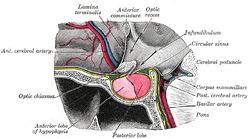Assessment |
Biopsychology |
Comparative |
Cognitive |
Developmental |
Language |
Individual differences |
Personality |
Philosophy |
Social |
Methods |
Statistics |
Clinical |
Educational |
Industrial |
Professional items |
World psychology |
Biological: Behavioural genetics · Evolutionary psychology · Neuroanatomy · Neurochemistry · Neuroendocrinology · Neuroscience · Psychoneuroimmunology · Physiological Psychology · Psychopharmacology (Index, Outline)

The posterior pituitary comprises the posterior lobe of the pituitary gland.
The posterior pituitary (also called the neurohypophysis) comprises the posterior lobe of the pituitary gland and is part of the endocrine system. It consists mainly of neuronal projections (axons) extending from the supraoptic and paraventricular nuclei of the hypothalamus that secrete peptide hormones into the capillaries of the hypophyseal circulation. The neurohypophysis also contains a specialised type of astrocytic glial cell - "pituicytes".
Anatomy[]
Despite its name, the posterior pituitary gland is not a gland, per se; rather, it is largely a collection of axonal projections from the hypothalamus that terminate behind the anterior pituitary gland. It is derived embryonically from downward-growth of the diencephalon. This tissue receives its blood supply from the inferior hypophyseal artery, and secretes hormones into the hypophyseal vein. These hormones are actually made in the hypothalamus and transported to the posterior pituitary gland, where they are stored.
The posterior pituitary has three main components:
Major hormones secreted[]
Hormones known classically as posterior pituitary hormones are synthesized by the hypothalamus. They are stored and secreted by the posterior pituitary into the bloodstream.
| Hormone | Target | Effect |
| Oxytocin | Uterus, mammary glands | Uterine contractions; lactation |
| Vasopressin (antidiuretic hormone; ADH) | Kidneys or Arterioles | Stimulate water retention or raise blood pressure by contracting arterioles |
Role in disease[]
Insufficient secretion of vasopressin is central diabetes insipidus, in which the body loses the capacity to concentrate urine. Affected individuals excrete as much as 20 L of dilute urine per day. Oversecretion of vasopressin causes the syndrome of inappropriate antidiuretic hormone.
One can readily see if the functioning of this structure is affected by psychological stress via the rest of the neuroendocrine system why mothers might have difficulty giving birth, why they might have difficulty breastfeeding or why some individuals might experience kidney or micturation problems.
See also[]
References & Bibliography[]
Key texts[]
Books[]
Papers[]
Additional material[]
Books[]
Papers[]
External links[]
| Endocrine system - Pituitary gland - edit |
|---|
| Posterior pituitary: Pars nervosa | Median eminence | Infundibular stalk |
| Anterior pituitary: Pars intermedia | Pars tuberalis | Pars distalis | Somatotropes | Lactotropes | Thyrotropes | Gonadotropes | Corticotropes |
| This page uses Creative Commons Licensed content from Wikipedia (view authors). |